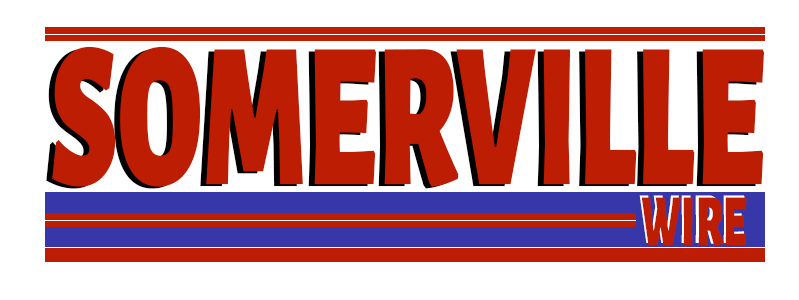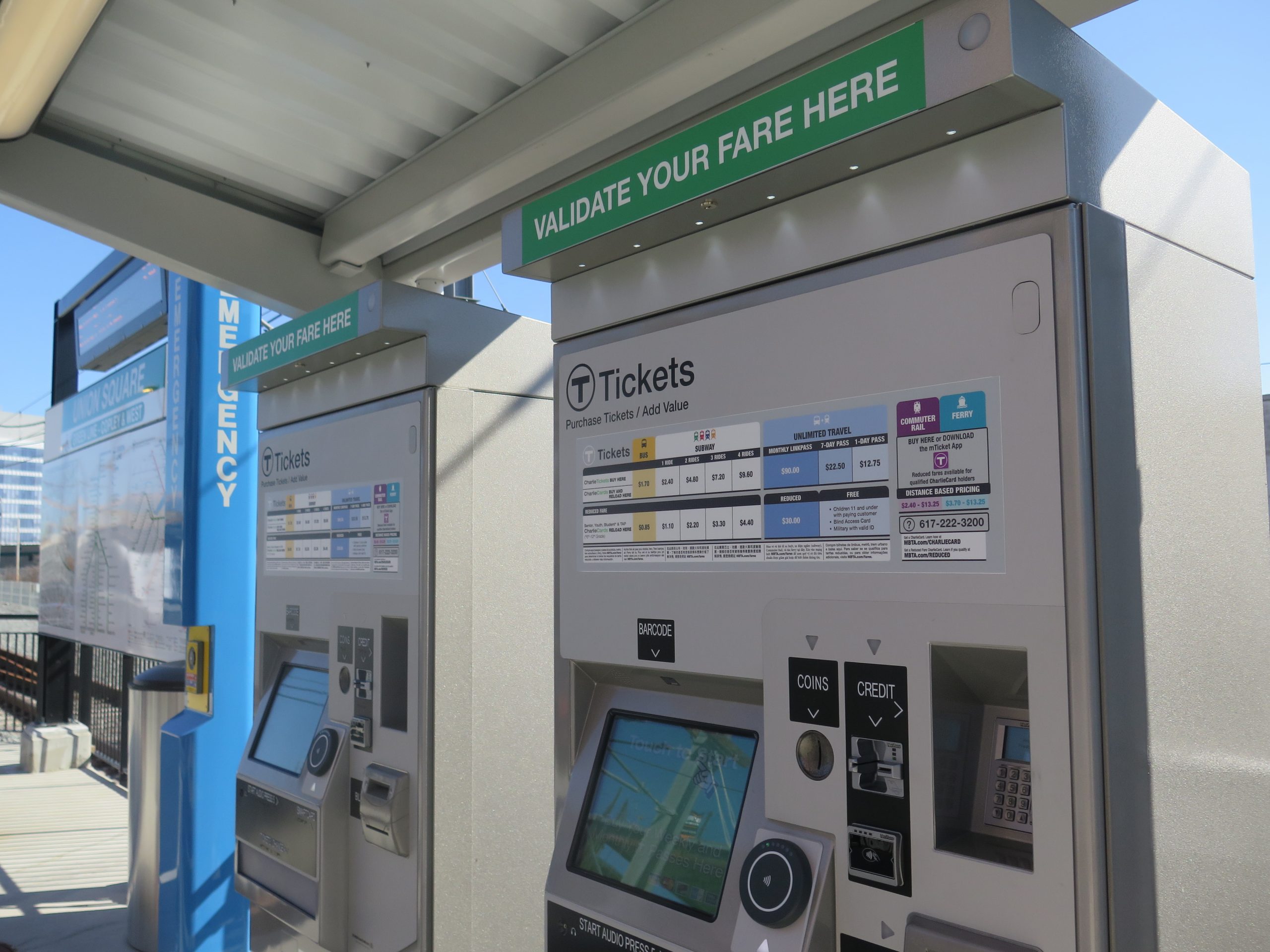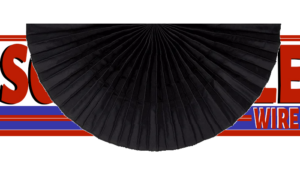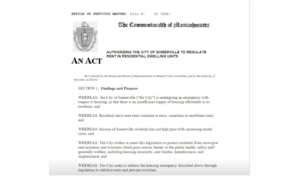Photo by Shira Laucharoen
Pols raise concerns about the temporary design at the new stations
(Somerville Wire) – If you are looking to board the GLX at the new Union Square and Lechmere stations, you will find that there are no turnstiles to pass through. This is because the MBTA is temporarily implementing a different system, which is being used in advance of the phased rollout of the system-wide fare collection program known as Fare Transformation. To validate your fare, you must tap your CharlieCard or CharlieTicket at a fare vending machine, where you will receive a receipt, to be verified by a staff member on board the train. Visitors also have the option of validating their fare at a farebox at the front of the train. A representative from the MBTA, Lisa Battiston, explained that this system is a short-term program that will be in place before “Fare Transformation”—which will “make paying for fare easier … and also [make] transit service faster”—launches.
“The new Lechmere and Union Square stations were designed to not have fare gates and support the future fare collection system, including tappable readers at all doors for boarding. The opening of these new stations is an immediate expansion of T services, but ahead of the phased roll-out of the system-wide fare collection advancements. The MBTA has created an interim process for fare validation prior to boarding at the fare vending machines. In addition, riders may continue to validate at the farebox at the front of the train,” wrote Battiston, in a statement. “Riders at all GLX stations will board from a center platform. This means that the front door with the farebox will not open to riders as it does at all other surface stations. Riders may continue to choose to tap at the farebox at the front of the train at both Lechmere and Union Square Stations but will have to walk up to the front of the train to do so.” She added, “The MBTA encourages riders to validate at the fare vending machine prior to boarding or at the farebox at the front of the train. Riders who have not validated at a fare vending machine are asked to pay their fare at the farebox on board the train.”
Battiston, who would not grant the Somerville Wire an interview with an MBTA employee, said that when Fare Transformation is implemented, staff members will be making sure riders have paid their fare.
“The MBTA is currently in the process of designing our fare verification program, which will launch as part of the broader Fare Transformation initiative. The program’s aim is to ensure fare payment by proactively assisting customers to adjust to the new fare payment system and ultimately issuing citations for riders who do not comply with the MBTA’s fare payment policies,” wrote Battiston. “The fare verification team will consist of uniformed, non-police, MBTA employees who will travel the system in teams to assist riders and conduct proof-of-payment inspections. Fare verification will primarily occur onboard vehicles and teams will be distributed throughout the system, with a focus on ungated modes. We are designing fare verification policies and protocols to ensure that no particular community or demographic group is disproportionately inspected, and with rider and staff safety as our top priority.”
Councilor Jake Wilson expressed concern about the temporary system in place at the Union Square and Lechmere stations. The system, he said, is an impermanent solution to a problem—the fact that the stations opened ahead of when the MBTA was expecting to implement Fare Transformation.
“My understanding is that people were not expecting the GLX to come online as quickly, including the MBTA, because it beat the new fare collection system. So this is a stop-gap measure,” said Wilson. He added, “I would call it a very bumpy rollout. But what’s really going on is—why are we even messing with all of this? It costs so much money, it’s so much trouble … This is a temporary plan until the new, billion-dollar fare collection system comes.” He added that he does not know how fare collection will effectively be enforced, when riders are required to show their receipts to staff members on the train. “My understanding is that if a rider were to be discovered to not have the slip of paper showing validation of a fare paid, they could be subject to fines and potentially arrest for fare evasion. … But the enforcement mechanism is just not there.”
When asked if every rider of the T will necessarily interact with a staff member, Wilson said, “It is my understanding that that will not be happening. From everything I’ve read, it’s more of a system of spot checks. You might be asked at any point in time to produce a paper receipt showing validation of your fare payment, and it’s really the threat of that enforcement that is meant to compel compliance.” Wilson raised concern about what will determine whether a staff member interacts with a rider. “I would hope it’s not done on any basis of racial profiling. I think anytime you are leaving something up to the subjective decision making of an enforcement body, there’s going to be the potential for implicit bias or outright bias to come into effect. So yes, I have concerns about spot enforcement and how that would be carried out, making sure that that’s done in a way that is fair and doesn’t specifically target any demographic. … If they’re going to do spot checks, there should be very clear departmental policies on who gets checked, under what circumstances, and perhaps employees should take some sort of bias training.”
Senator Pat Jehlen expressed that she is skeptical about the system and would prefer to have free public transit come into being. She also added that she would like to see a cost-benefit analysis from the MBTA and highlighted some of the difficulties that the fare collection process presents.
“There’s two steps. There’s an extra person involved, because there’s no gate,” said Jehlen. “But on the other hand, the space is open. You just walk through. So you’re counting on somebody paying somebody to walk around and check the paper, which you have to carry with you and not lose. I would have to be convinced that that is more efficient.”
This article is syndicated by the Somerville Wire municipal news service of the Somerville News Garden project of the Boston Institute for Nonprofit Journalism.
All Somerville Wire articles may be republished by community news outlets free of charge with permission and by larger commercial news outlets for a fee. Republication requests and all other inquiries should be directed to somervillewire@binjonline.org. Somerville Wire articles are also syndicated by BINJ’s MassWire state news service at masswire.news.
SUBSCRIBE TO THE SOMERVILLE WIRE EMAIL NEWSLETTER: https://eepurl.com/hpBYPv
Check out all our social media here: https://linktr.ee/SomervilleWire.
Shira Laucharoen is assistant director of the Boston Institute for Nonprofit Journalism and assistant editor and staff reporter of the Somerville Wire.





